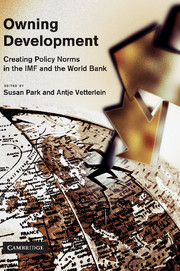Book contents
- Frontmatter
- Contents
- List of figures
- List of tables
- List of contributors
- Preface and acknowledgements
- List of acronyms and abbreviations
- Part One Introduction
- Part Two Norm emergence
- Part Three Norm stabilization
- Part Four Norm subsiding
- 8 The IMF and capital account liberalization: a case of failed norm institutionalization
- 9 The World Bank's global safeguard policy norm?
- 10 The new public management policy norm on the ground: a comparative analysis of the World Bank's experience in Chile and Argentina
- Part Five Conclusion
- Bibliography
- Index
8 - The IMF and capital account liberalization: a case of failed norm institutionalization
Published online by Cambridge University Press: 02 December 2010
- Frontmatter
- Contents
- List of figures
- List of tables
- List of contributors
- Preface and acknowledgements
- List of acronyms and abbreviations
- Part One Introduction
- Part Two Norm emergence
- Part Three Norm stabilization
- Part Four Norm subsiding
- 8 The IMF and capital account liberalization: a case of failed norm institutionalization
- 9 The World Bank's global safeguard policy norm?
- 10 The new public management policy norm on the ground: a comparative analysis of the World Bank's experience in Chile and Argentina
- Part Five Conclusion
- Bibliography
- Index
Summary
Introduction
While virtually all elements of the original agenda of the ‘Washington Consensus’ have become global policy norms over the course of the past twenty years, the case of free capital mobility stands out as an outlier. In his original formulation of the ‘to-do-list’ for economic reformers, John Williamson deliberately did not include capital account liberalization since he felt that no consensus could be reached in the late 1980s regarding its inclusion in the neoliberal reform package for developing countries (Williamson 1990). Yet capital account liberalization did become associated with the original Washington Consensus and even without formal validity reached the stage of norm emergence. A major driving force behind making capital mobility a policy norm was the International Monetary Fund (henceforth, the IMF or the Fund). However, despite strong support among the international financial institutions and the major powers in the global economic system, the unrestricted movement of international capital failed to leave the stage of norm emergence and to become a stabilized norm in the international financial system.
In order to account for this outcome, we trace the evolution of the IMF's thinking on capital account liberalization from the early 1990s to the present. Specifically, we review the Fund's initial position on the benefits of liberalization, defined in terms of economic growth and market discipline. In doing so, we argue that the IMF has progressively reinterpreted the norm in terms of its allegedly welfare-enhancing effects, shifting from considering capital account liberalization as one of the essential variables that explain economic growth, to questioning this logic, to then highlight the positive alongside the negative effects of free capital mobility for developing countries.
- Type
- Chapter
- Information
- Owning DevelopmentCreating Policy Norms in the IMF and the World Bank, pp. 163 - 180Publisher: Cambridge University PressPrint publication year: 2010
- 10
- Cited by



